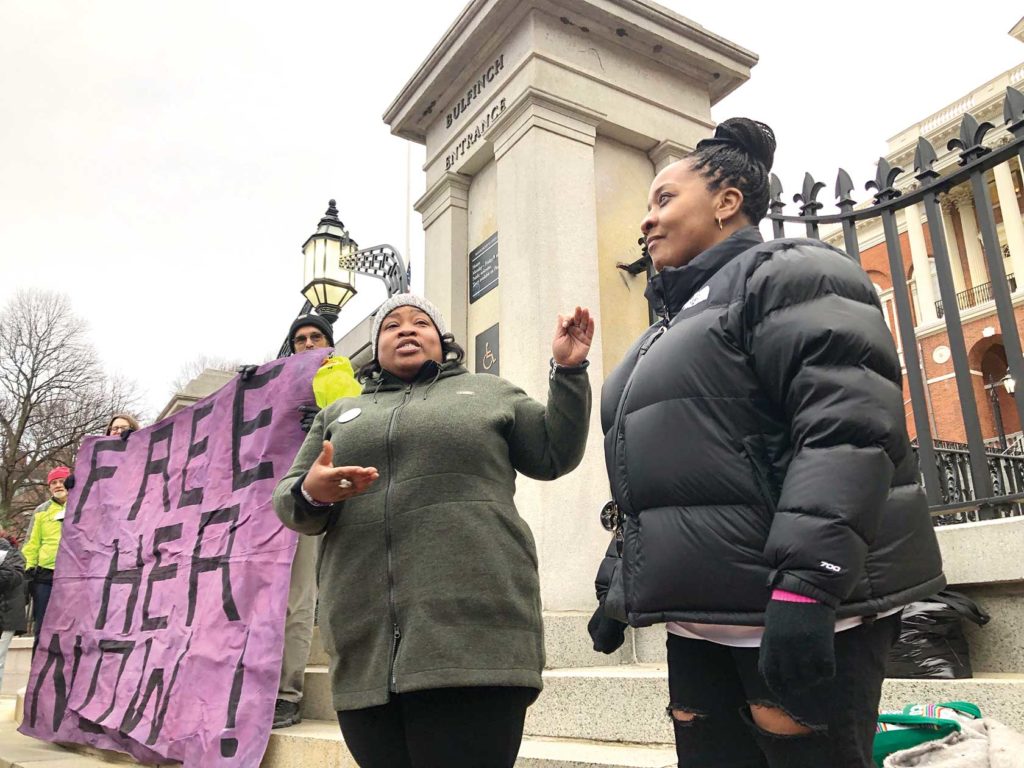
Advocates for a moratorium on the construction of new prisons in Massachusetts are calling on Gov. Maura Healey to support legislation that would mandate such a policy, after former Gov. Charlie Baker used his veto power to block those efforts last year.
Healey has at least signaled sympathy for the advocates’ cause.
In a statement sent to the Banner this week, a spokesperson for Healey said, “Governor Healey supports efforts to stop new construction of prison infrastructure while ensuring we can rehabilitate existing structures to maintain safe, modern facilities and attain quality programming and services.”
The statement comes days after advocates for such a moratorium rallied outside the State House. Advocates demanded not only a halt to new prison construction statewide, but also that policymakers redirect resources away from incarceration and toward community-based programs aimed at ending incarceration and supporting those individuals, especially women and girls, returning from incarceration.
“Massachusetts has the lowest incarceration rate in the country. And so now is the right time, and this is the right place” to begin diverting resources away from prisons, said Mallory Hanora, executive director of Families for Justice as Healing, a group whose mission is to end the incarceration of women and girls.
Advocates chanted “Free her!” at the State House rally.
“We can be a model here,” said Hanora. “We could be focusing on decarceration, implementing alternatives to incarceration and massively resourcing communities for what we know women and families in our communities need to thrive.”
A five-year moratorium on prison construction, Hanora said, would not only free up resources toward those goals but would “give us the time to further reduce the incarcerated population, bring women home, release women and resource communities.”
Healey’s statement would seem to support such a moratorium, but Hanora cautioned that she and other advocates remain wary of what exactly the governor’s comments so far mean — especially when it comes to a proposed $50 million “rehabilitation” of the MCI Framingham women’s prison, which advocates see as constituting the construction of a new prison facility without any concurrent promise to permanently shutter the Framingham prison.
“The goal of the moratorium is to stop massive construction projects that have the goal of expanding incarceration or essentially rebuilding a prison,” Hanora told the Banner.
The proposed rehabilitation project — which Healey has not said she opposes — goes far beyond repairs, Hanora said.
“We want [Healey] to publicly commit to not moving forward” with the $50 million project, Hanora said.
Legislation that would impose a five-year moratorium on prison construction has been re-filed in both the state Senate and House this legislative session, after having passed the legislature last year — a rare achievement for first-time bills — only to be vetoed by Baker.
State Sen. Jo Comerford, who re-filed the Senate version this year alongside House sponsor Rep. Chynah Tyler, said that she hopes that this time, it will get a different reception from Healey than it did from her predecessor.
“It’s a new administration, and a new administration will do new things, so I’m hopeful,” Comerford told the Banner.
Comerford said that with the number of women housed in state prison at record lows, the legislation is timely.
“What we need to do is move in the direction of continuing to bring those numbers down, and not invest in a new facility, which will certainly be a self-fulfilling prophecy,” Comerford said. “A new [prison] facility really signals we’re not going to go in another direction … meaning another generation of women and their daughters will have to face the same sort of carceral system as the people who came before us.”
Those sentiments ring true for Angela Jefferson, a mother and grandmother who spent 31 years incarcerated at MCI Framingham and who was released just last year.
Speaking at last week’s rally, Jefferson said the Commonwealth’s focus should be on bringing women like herself home and on improving the conditions of those women still incarcerated at MCI Framingham.
“The conditions in that prison are unexplainable,” said Jefferson. “So many of the lifers in that prison are dealing with so many issues right now, and they’re not getting the care they need to help them through.”
Standing alongside her, Jefferson’s daughter, Shanita Jefferson, recalled the pain of growing up with an incarcerated mother.
“I grew up thinking that my mother was going to die in [MCI] Framingham,” Jefferson said. “When I was 7, I told myself, ‘Shanita, when you get older, you’re to move to Framingham to be close to her,’ because I felt she would never come home.”
Speaking through tears, Jefferson added: “This is our seventh month together, together on the outside.”


![Banner [Virtual] Art Gallery](https://baystatebanner.com/wp-content/uploads/2024/04/Cagen-Luse_Men-at-store-e1713991226112-150x150.jpg)



